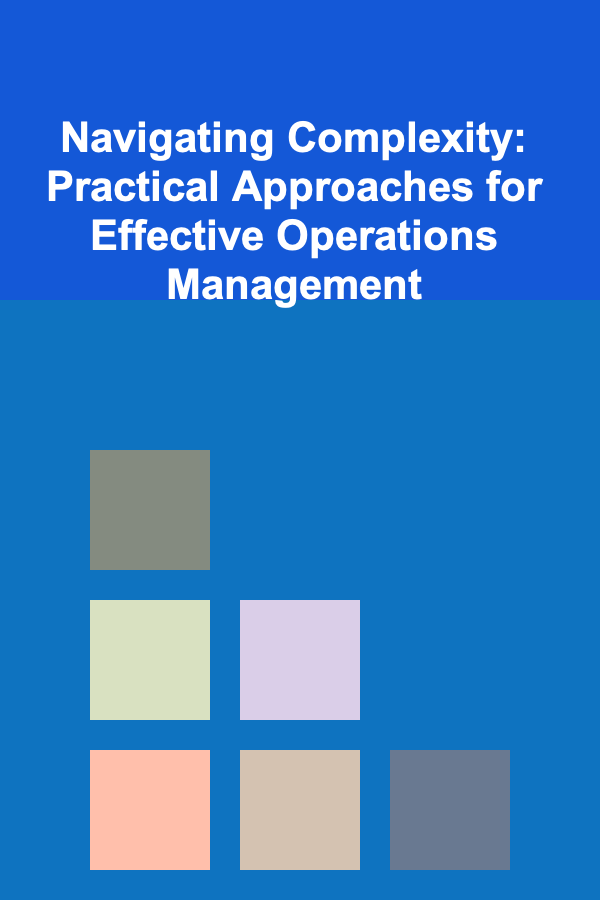
Becoming a Successful Account Manager: Proven Techniques for Effective Client Solutions
ebook include PDF & Audio bundle (Micro Guide)
$12.99$5.99
Limited Time Offer! Order within the next:

Account management is a dynamic and rewarding role that is at the core of maintaining long-lasting client relationships. As an account manager, your primary responsibility is not only to meet clients' needs but also to proactively ensure their success, fostering trust and maximizing value. To excel in this role, an account manager must adopt a mindset of strategic thinking, exceptional communication, and relentless problem-solving. This guide explores proven techniques to help you become a successful account manager by focusing on delivering effective client solutions.
Building Strong Client Relationships
At the heart of effective account management is the ability to build strong and meaningful relationships with your clients. A successful account manager is seen as a trusted advisor who understands the client's goals, challenges, and vision. Here are some key strategies to establish and nurture these relationships:
1.1 Understand the Client's Business
The foundation of every strong client relationship is a deep understanding of the client's business. Take the time to learn about their industry, competitors, pain points, and goals. This knowledge enables you to provide solutions that are not only effective but also aligned with the client's long-term strategy.
Actionable Tip:
- Research the client's market landscape, industry trends, and challenges they may be facing.
- Schedule regular meetings with key stakeholders to stay up-to-date with changes in their business objectives and needs.
1.2 Personalized Communication
Clients appreciate personalized communication that demonstrates you understand their unique situation. Generic responses or an impersonal approach can quickly erode trust. Tailor your communication style to each client, showing that you recognize their individual needs and business priorities.
Actionable Tip:
- Keep detailed notes about clients' preferences, challenges, and past interactions in a CRM or client management system. Refer to this information during your conversations to show you're invested in their success.
- Always address clients by their preferred names and take note of personal milestones, such as anniversaries or birthdays, to send thoughtful messages.
1.3 Consistent and Open Communication
Clear, consistent, and honest communication is essential in managing client expectations and fostering strong relationships. Clients should never be left wondering about the progress of their projects or the status of a particular request. Open communication also helps prevent misunderstandings, building trust over time.
Actionable Tip:
- Set expectations early in the relationship regarding how often and through which channels you'll communicate.
- Regularly update clients on project status, potential issues, and the steps you are taking to address them.
1.4 Active Listening
The ability to actively listen to clients is a vital skill for any account manager. Listening attentively not only shows respect but also helps you understand the underlying needs and desires of your clients. Often, clients may not explicitly state what they want; instead, they will hint at issues that need attention or improvements that can be made.
Actionable Tip:
- During meetings, refrain from interrupting the client. Instead, focus on listening and summarizing what they've shared to confirm that you understand their concerns.
- Ask clarifying questions to ensure you grasp their goals accurately, e.g., "Could you elaborate on what success looks like for this project?"
Proactively Identifying and Solving Client Problems
Problem-solving is a core responsibility of any account manager. However, the most effective account managers don't just react to problems when they arise; they anticipate challenges and take proactive steps to prevent issues before they become obstacles. Here's how you can approach problem-solving effectively:
2.1 Stay Ahead of Potential Issues
Proactively managing accounts means identifying potential problems before they escalate. This involves monitoring ongoing projects, tracking client feedback, and staying on top of industry changes that could impact your client. By addressing potential issues early, you can minimize disruptions and maintain client satisfaction.
Actionable Tip:
- Regularly review project timelines, deliverables, and performance metrics to spot any signs of delay or misalignment.
- Engage in anticipatory planning by discussing with your client any foreseeable challenges that could affect their goals.
2.2 Provide Solutions, Not Just Answers
Clients appreciate solutions that address their pain points comprehensively. While answering a client's query is important, providing solutions that go beyond the surface level can demonstrate your expertise and commitment to their success. This approach turns you from a problem-solver into a strategic partner.
Actionable Tip:
- When a problem arises, offer multiple solutions with pros and cons for each, allowing the client to feel in control of the decision-making process.
- Use your industry knowledge to propose innovative solutions that the client may not have considered.
2.3 Take Responsibility and Be Accountable
Taking responsibility for both successes and failures is essential to building trust. Clients will respect an account manager who is accountable for the outcomes of a project. If things don't go as planned, openly acknowledge it, take responsibility, and present a clear plan of action for moving forward.
Actionable Tip:
- In the event of a mistake or delay, communicate promptly with the client. Provide a clear and honest explanation, along with steps to resolve the issue.
- Avoid passing blame, and instead, focus on how you can remedy the situation in a timely and professional manner.
Delivering Exceptional Client Solutions
Once you've built trust and established open lines of communication, the next step is to ensure that your clients are consistently receiving solutions that meet or exceed their expectations. Your role is to align your services with the client's goals and deliver value that supports their growth.
3.1 Understand and Align with Client Goals
The most effective solutions are those that are perfectly aligned with your client's business objectives. Spend time discussing their goals in detail, asking questions about their vision, and finding out what success looks like for them. Your role is to tailor solutions that not only solve immediate issues but also contribute to the client's long-term success.
Actionable Tip:
- Start each engagement by asking your client to outline their goals for the project or partnership.
- Continuously assess whether the solutions you're providing are in line with their evolving goals and needs, adjusting as necessary.
3.2 Value-Added Services and Upselling
In many cases, your clients may not even realize the full scope of what your company can offer. As an account manager, it's important to help clients see additional value through upselling or introducing new services that could benefit them. However, upselling should be done thoughtfully, with a focus on the value it provides to the client.
Actionable Tip:
- During regular check-ins, ask about changes in the client's business that may open the door for additional services.
- Present new services as solutions to existing challenges or ways to further enhance their operations.
3.3 Deliver Consistent Results and Value
Clients need to see tangible results from the solutions you provide. It's not enough to simply fulfill their immediate needs; you need to deliver lasting value. This requires ensuring that all deliverables meet high standards and are consistently delivered on time. Satisfied clients are more likely to stay long-term and recommend your services to others.
Actionable Tip:
- Set clear expectations around timelines, quality, and measurable outcomes from the outset. Ensure your team delivers on those promises.
- After completing a project, provide the client with a report that highlights the value delivered and the results achieved.
Managing Expectations and Preventing Client Dissatisfaction
Effective account management is about setting and managing expectations. Even the most proactive account managers may face client dissatisfaction at some point. Preventing and mitigating dissatisfaction involves clear communication, transparency, and addressing issues before they escalate.
4.1 Be Transparent About Limitations
It's crucial to set realistic expectations with your clients. While you want to over-deliver, it's equally important to be honest about what can and cannot be accomplished within a specific timeframe or budget. Misleading clients about what can be achieved will only lead to dissatisfaction down the line.
Actionable Tip:
- Early in the relationship, discuss any potential limitations or constraints that could affect timelines or deliverables.
- Be upfront about potential risks or challenges and work with the client to set expectations accordingly.
4.2 Manage Difficult Conversations with Empathy
At some point, you'll encounter difficult conversations with clients. These might involve disappointments, unmet expectations, or frustrations. The key is to approach these conversations with empathy, active listening, and a focus on finding a mutually beneficial resolution.
Actionable Tip:
- Approach difficult conversations with a solution-oriented mindset. Acknowledge the client's frustrations and reassure them that you are committed to resolving the issue.
- Avoid becoming defensive. Instead, take responsibility where appropriate, and offer actionable steps to improve the situation.
Continuously Improving Your Account Management Skills
To stay competitive and effective in your role, continuous learning and development are essential. Account management is an ever-evolving field, and staying ahead of industry trends, client needs, and technological advancements will help you remain relevant and effective.
5.1 Invest in Professional Development
The best account managers are always refining their skills. Look for opportunities to attend workshops, webinars, or industry conferences to learn new techniques and tools for better managing client relationships.
Actionable Tip:
- Pursue certifications or online courses related to account management, project management, or communication to enhance your skill set.
- Seek mentorship from experienced account managers who can provide insights and guidance based on their own experiences.
5.2 Learn from Your Experiences
Each client interaction presents an opportunity to learn and improve. After every project or engagement, take the time to reflect on what worked well and what could have been improved. Use these lessons to adjust your approach for future clients.
Actionable Tip:
- Create a feedback loop with clients to gain insights into your performance and areas for improvement.
- After completing projects, conduct post-mortem analyses to identify both successes and areas where you can refine your process.
Conclusion
Becoming a successful account manager is a combination of skill, experience, and mindset. By developing strong relationships, proactively solving problems, delivering tailored solutions, and continuously improving your skills, you can position yourself as a trusted partner who adds significant value to clients' businesses. Focus on the client's long-term success, and the rewards---both professionally and personally---will follow.

How to Allocate Funds for Entertainment and Leisure
Read More
How to Design the Perfect Party Layout for Small Spaces
Read More
How to Involve Local Businesses in Supporting Your Reunion
Read More
How to Price for International Markets in Your Dropshipping Store
Read More
Navigating Complexity: Practical Approaches for Effective Operations Management
Read More
Top Free Resources You Can Access by Utilizing Public Libraries
Read MoreOther Products

How to Allocate Funds for Entertainment and Leisure
Read More
How to Design the Perfect Party Layout for Small Spaces
Read More
How to Involve Local Businesses in Supporting Your Reunion
Read More
How to Price for International Markets in Your Dropshipping Store
Read More
Navigating Complexity: Practical Approaches for Effective Operations Management
Read More